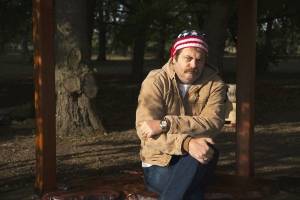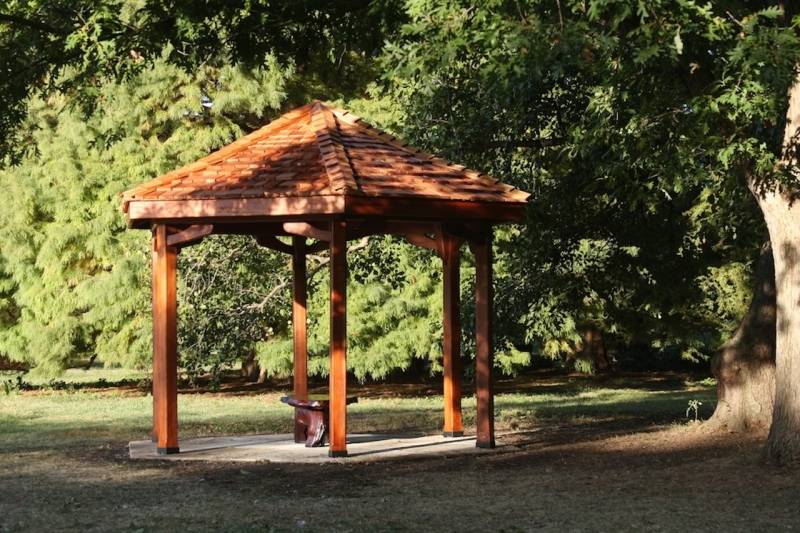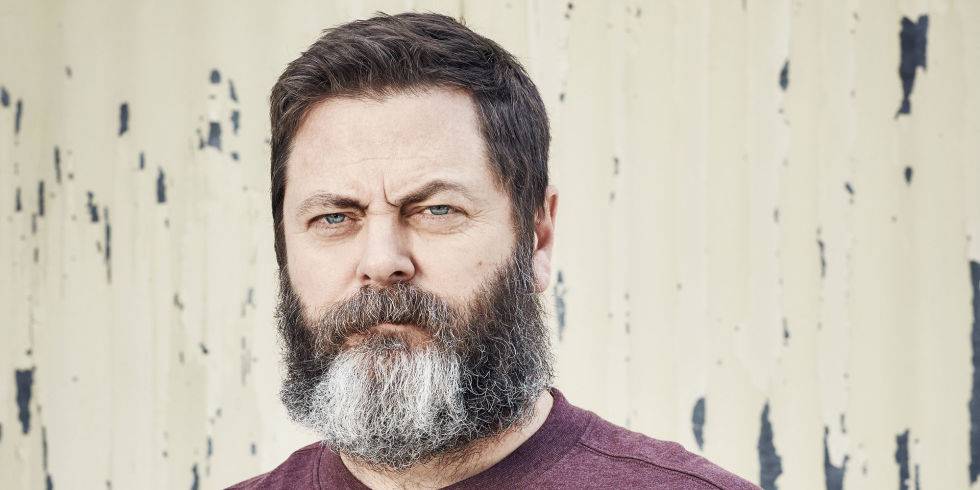It’s probably for the best that I never saw a single episode of Parks and Recreation until long after it went off prime time television and into syndication.
My knowledge of Nick Offerman, who graduated from U of I in 1993 with a degree in Theatre, was non-existent until I’d heard about the show, and by the time I got a chance to really start listening to him, and reading his words, I’d already become a fan simply based on our shared alumni status.
Fortunately, Nick Offerman is no ordinary television star. He’s also a stand-up comedian, a songwriter, a screenwriter, an activist, and, most importantly to us here in Champaign-Urbana, a carpenter who places a premium on sharing when he can and where he can.

A cursory amount of research will give you a long look into what is an extremely illustrious career since his childhood in Minooka, Illinois. Ever since he stepped foot on campus, here in Urbana, he’s been prolific in every sense of the word.
Locally, he’s made his mark. At Illini basketball games, hyping up the crowd in character as Ron Swanson (from his role in Parks and Rec); doing lectures and stand-up at Foellinger and Krannert Center; and most impressively, building an “azumaya” — or a Japanese pergola — across from the pond on the grounds where Japan House sits. It is one of the most fantastic additions to our community that we’ve received in the past decade and more.

His ties to the campus and community stem from a deep relationship and friendship with his former Professor Shozo Sato, who spent his career developing an unparalleled and revolutionary style of kabuki theatre in a unique way from the echoed halls of Krannert Center, and presenting Western classics, reinterpreted through the lens of the near-ancient Japanese art form.
Through that relationship, C-U has benefitted immensely, with Offerman continually offering his widely known and very much loved personality and talents towards raising money for the self-sustaining project founded by Professor Soto.
Japan House represents the best of C-U. It is not the sort of resource and cultural education tool that every community carries, especially the size of our own.
Nick Offerman returns tomorrow, Saturday April 1st, to help keep it funded with a charity benefit which will feature tastings of Japanese whiskeys, Black Dog BBQ, and of course, some face time with the man himself, who was willing, and even eager, to catch up with us here at Smile Politely.
Smile Politely: So, thank you for taking a little time, Nick. I’m going to try and make this as painless as possible for you.
Nick Offerman: [Laughs] My pleasure.
SP: So, I’m kind of curious about Minooka, and whether you’re still going back there on a regular basis, and whether or not it’s still home for you.
Offerman: Well, yeah I mean, it’s still my home town. They have a large, wonderful Illinois family all living in Minooka. And, they’re public servants, it’s a family of great Americans; school teachers, librarians, paramedics, nurses, farmers, and one craft brewer. Which, of course, [laughs] makes him the king of the family.
SP: Indeed, no question. Well, Minooka is actually a really interesting town because it sits in three counties, which is really rare I think.
Offerman: Yeah, I think so. Especially for given how small it was growing up. It’s added some pretty intense saddle bags of suburbs, of housing development recently.
SP: Yeah, that’s what I was curious about, because I grew up in Urbana and you know, you’ve got Champaign and Urbana, divided by Wright Street, and they’re different, they’re obviously different. But, in a smaller town like Minooka, having three different counties, you’ve got three different county governments, you’ve got three different sheriffs, you’ve got one mayor, you’ve got one police force, one fire station, but it seems like it could get convoluted.
Offerman: Yeah, Mom was never sure which jail I was thrown in.
SP: [Laughs] Yeah, I imagine that can get confusing.
Offerman: It’s more a matter of mileage.
SP: Sure, [laughs] and it’s kind of good to know that you still have home there. Home can be anywhere and it changes, but it’s nice when home stays home, I think. I looked it up and the internet is claiming it’s a suburb. Do you think it’s a suburb?
Offerman: Oh, no.
SP: Yeah, I don’t think so either.
Offerman: I mean, simply because there are still some miles of agriculture. We’ve got Joliet between us and Chicago, and I feel like Joliet is maybe the first autonomous city there.
SP: Yeah, for sure. You know, my thought is that if the Metra Train doesn’t run there, it’s not a suburb, and it doesn’t. So, you went to school here ’88-’93, and especially then, the music scene here was a big thing. You’ve had a strong relationship with Wilco and Jeff Tweedy for a while now and I guess I’m curious if you know anything about Wilco’s history in Champaign-Urbana, and if that ever comes up in discussion.
Offerman: Not really, I mean Jeff and I have talked a lot about both being kind of, rural country boys from Illinois, although my Chicago was his St. Louis. But no, I had my head buried in Krannert Center, pretty much 24/7, or at the Armory Theatre. I don’t know if that’s still up and running.
SP: You know, I haven’t seen a lot coming out of their lately; it seems like it was more active in the past.
Offerman: Well, it was a very big deal to me and my peers was having that free theatre space. That’s where our company, the Defiant Theatre, was born.
SP: Indeed, it’s an amazing space. Small in the best ways. Anyhow, you did songs with Jeff Tweedy for the audiobook, Good Clean Fun and the history of Wilco runs pretty significantly through Champaign-Urbana as a result of their work with Jay Bennett and his time with the band. Jay Bennett, of course, was from Urbana and had a band called Titanic Love Affair, that was pretty popular when you were in college and then when that broke up, he joined Wilco for Being There and Summerteeth and Yankee Hotel Foxtrot, and then, the demise of that relationship was really on display for the documentary film I am Trying to Break Your Heart. For people here, Wilco has a really interesting history. We can’t claim them the same way we can claim other artists like REO Speedwagon or HUM or Irving Azoff, but Wilco and Jay Bennett being part of that band is very much part of who we are as a music scene.
Offerman: I probably would have really enjoyed seeing his band while there, but I knew a brother and sister, and I think they were from Rantoul originally, and they had a band called EKG.
SP: Yeah, yeah. I was reading about them recently on Facebook. There’s a lot of great history coming out because of a friend who is shooting a documentary on the scene here at that time.
Offerman: The sister was the lead singer. I guess we knew her, because one of our theatre company members worked at the cool, old record store on Green street.
SP: Yeah, Record Service.
Offerman: And so we knew them. I remember going to the Blind Pig a couple times, but we were broke. We pretty much survived on listening to They Might Be Giants or Tom Waits while we built some scenery for a production.
SP: So, you’re coming back again for another benefit for Japan House, which has become yet another of your projects as of late, it seems. One of my earliest memories from when I went to grade school here at Yankee Ridge in Urbana was going to see a daytime production of a kabuki theatre at Krannert Center, and then doing the Japanese tea ceremony at the old Japan House. And coming from the perspective of living in the middle of the country, having those experiences were kind of life shaping. So, your relationship with Professor Soto makes sense. His impact here is obviously very strong. How frequently are you talking with him and how frequently are you keeping Japan House on your radar? Is it something that (Director) Jennifer (Gunji-Ballsrud) and (Assistant Director) Cynthia (Voekl) bring to you or are you consistently having that discussion year in and year out?
Offerman: Well, I do my best to be a halfway dependable child. Usually when I call Shozo, I say “It’s your bad son”, because it’s always a couple months too long between phone calls. I get back to Minooka a couple times a year and I really appreciate it when I can involve Champaign-Urbana in my travels, because I just have a lot of gratitude. I mean, when the idea came up for building the azumaya, which is that gazebo.
SP: It’s magnificent.
Offerman: You know, I jumped at the chance to do that, because if you went to one matinee and saw one tea ceremony and that had an affect on you, imagine what years of discipleship did to my own life.
SP: Yeah, I can only imagine. The friendship formed seems incredible. He officiated your wedding, after all. This is not some “Hey, that was good professor”, this is a lifelong friendship, a defining friendship.
Offerman: Yeah, yeah. It’s something that I’m tickled that I can to pitch in. One of the luckiest things in my life was landing in Shozo’s classroom, and I don’t expect to ever achieve his degree of mastery in the arts. But I’ve found that I can have a vocation of passing along what he told me.
SP: From a community perspective, Champaign-Urbana doesn’t have a ton of that. Which is to say, we do have beautiful things. It’s super flat, there’s no water, not much natural beauty at all. This type of participation, this isn’t like writing a check, this is something that is going to last hopefully for decades if not centuries to come. It’s pretty amazing for all of us here. How much time do you get to spend these days woodworking? Obviously, you are busy, and you do all kinds of things. I went and saw your most recent picture, The Founder, with Michael Keaton and now you’ve acquired book rights to Lincoln in the Bardo, what appears to be a powerful story about Abe Lincoln’s son. How much do you get to practice and to be that part of you, the carpenter, the builder?
Offerman: Well, not nearly enough these days. It’s very sporadic. I focused my third book that came out in the fall, on woodworking in my shop, and dedicated the book to Shozo in fact. It’s because I had to trick the rest of my organization into letting me go to the shop for four months.
SP: Oh, now, I’m sure they loved it.
Offerman: Well, it takes some doing to carve that kind of calendar time out these days. Which is a wonderful problem to have. The nice thing is that the shop has become able to stand on its own two feet. I have six heroic woodworkers in there, and even today some of the gang is incredibly jealous. We’re upgrading our vacuum dust collection system. [Laughs] The fact that my women and men of Offerman Woodshop can keep all the plates spinning while I traipse about the planet, performing my japes for the royalty, is something, again, I’m very grateful for. In my book, Good Clean Fun, I single them all out and celebrate them, each of them has a chapter. And so, because it’s like a family, staying in touch with them and being consulted on decision making, keeps me a part of the operation. I get to be wood working from afar, even if my hands are getting soft.
SP: It’s a unique career. Which is to say that not every actor who played a mahor character on a major network program that was immensely successful have this type of life, one that I think is really relatable to a lot of folks. And I think that that’s why people enjoy your work, Nick. It’s certainly why I do. Which is to say, yes you are funny and you write well, and your character Ron Swanson was super effective but there’s this side of you that, it’s kind of nice to know that that exists. I think that most people around here are proud that you’re proud of Champaign-Urbana and the University of Illinois.
Offerman: Thank you, thank you. And to speak to that last question a bit further, I’d just like to plug a place called CU Woodshop, which is out at Parkland College. It’s an amazing woodworking store. You know, I’m grateful that I’m able to spread the gospel of the chisel. People often ask, there’s that disconnect between one’s life online versus “how can I find this in my own life?”. So, whenever I tour, I always encourage people, like if I mention my shop the audience always applauds, and I say, “Thank you? That’s strange.” But I take that, and if you are really a fan of one guy making furniture, look, whether you live in one county or at the triple crotch of three different counties, there are many people in spitting distance who are making cool stuff that you can support and perhaps befriend, and a lot of them can be found at CU Woodshop. They were very instrumental and generous in helping us when we built the azumaya and you know, there’s a family feeling among woodworkers. So, hats off to them.
SP: Yeah, Parkland is just an endless well of gifts to the community as well. We’re lucky in Champaign-Urbana to have not just one, but two, really incredible places that deal in higher education. It’s marvelous, what it provides.
Anyhow, I have one more question for you, but I am curious because today, oh Christ, Jesus, in Washington, Trump. I mean, it’s insane, and you know, I can hardly even read the news because I want to kill myself when I do it, but you’ve been a great voice of opposition to the new Trump presidency. So I guess I’m curious…how are you really feeling? I think like a lot of people, I’m thinking “How the fuck did this happen? How the fuck did we get here?” and I don’t want to marginalize everyone that voted for Donald Trump because these are some of my best friends growing up and I still love them. I do, of course I do. How can I not love them? I’ve known them my whole life. But I look at the policy and look at what’s going on and we kind of almost have to look to our celebrity voices, it’s just the world we live in. And yours of course, it’s hard not to chuckle when somebody that I follow on Twitter calls our President a Cheeto or a Nacho and follows that up with a salient argument. It makes me feel better. It makes me feel better about the world we live in. So I know your position and all, but here, now you are on the phone, so I suppose I can just ask, but… what are we supposed to do next? I don’t know, maybe you know. I am seriously lost.
Offerman: Um…
SP: I know that’s a big question, it’s broad. I’m sorry, if…
Offerman: No, no, it’s OK. [Pauses] Well, it’s the million-dollar question. I am about to start doing some touring, so I’m wrestling with that question. It’s the first time that I’m touring since the election. And so, I’m going to need to address that question to my audience, and you know one of the puzzling things is that the landscape shifts every day, you know sometimes three times a day. But, I think the silver lining of this dystopian moment is that it has made a great many of us Americans much more aware of how we were asleep at the wheel. And so, I’m an optimist when it comes to the American character, and I think this may be, hopefully the end of despicable corporate and racist and misogynist and phobic values in our government. That stuff will always exist. I think we let the shitty kid drive the bus and all the rest of us on the bus are saying “Whoops, that was… hang on”.
SP: Yeah, this was a mistake.
Offerman: Like you say, I’m very interested in addressing these issues, in a manner, arm in arm with all of my fellow Americans. Rather than continuing to shoot arrows at each other. It’s a reminder that we should always be working towards something better. I just try to keep it personal and keep my eye on decency. It’s tricky, but I’ve always said, “Us dipshits gotta stay together.”
I feel like my fellowship of dipshits is ever burgeoning.
Nick Offerman will be at Japan House tomorrow, Saturday April 1st. Tickets to the benefit are sold out.








